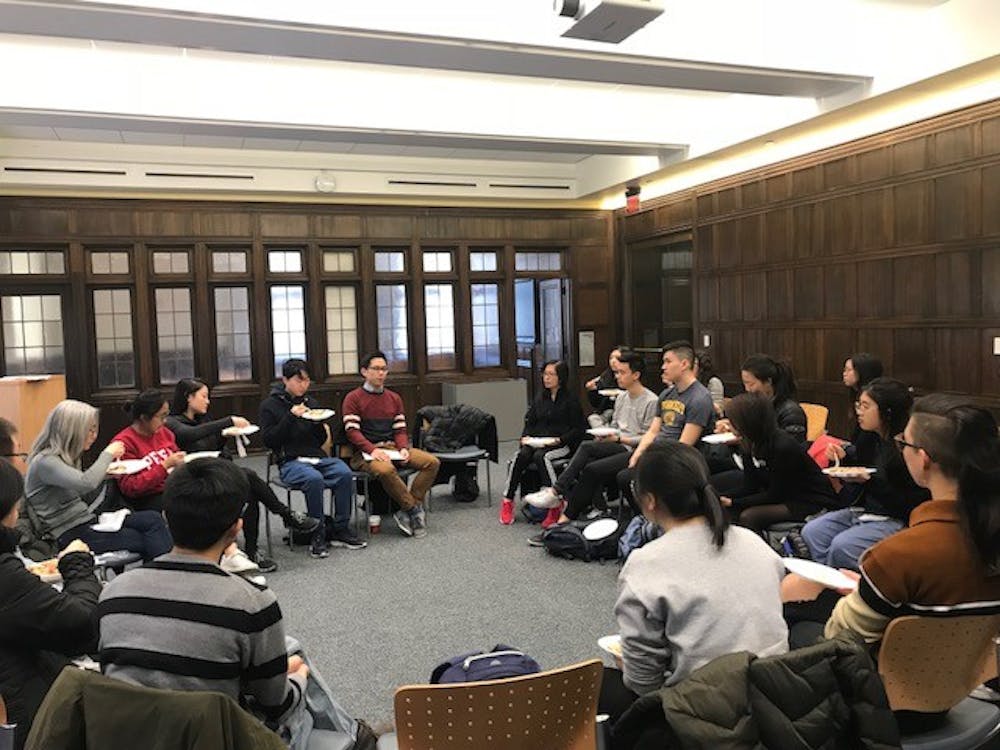2013 College graduate Anthony Tran spoke to students about what it's like working in the rapidly changing field of immigration law since President Donald Trump took office, as well as the importance of the Asian American Studies Program at Penn.
The event, which took place on Jan. 28 in ARCH, was hosted by ASAM, which has been functioning without a formal director for one year now. The void left by Grace Kao, who left her post to work at Yale University last year, has prompted student protests and opinion columns pressing for action from an administration they say is not doing enough to help the threatened program.

Tran discussed his time at Penn and his love for ASAM. As an ASAM minor, he studied topics pertaining to Asian immigration that affects clients he now works with in his job in immigration law.
Tran talked about the work he’s done over the past few years in employment-based immigration cases, where US employers can sponsor non-American employees for immigration visas and green cards — a field that has been transformed since Trump took office in 2017.
Before the Trump administration, Tran said the immigration system was already “slow and dysfunctional” with a long backlog for countries like India and China, sometimes taking eight or nine years to gain approval for a green card.
Since Trump assumed office, Tran said that the number of challenges to visa requests from the government has significantly increased and has made a difficult system even worse.
“The lengths to which we have to advocate for our clients is different from even a year ago,” Tran said. “This is definitely the worst case scenario.”
He noted that although employment-based immigration has less media attention as compared to undocumented immigration, it has also been drastically affected by the Trump administration’s policies.
“The rate at which things are changing is unprecedented,” Tran said. “None of us were prepared for Trump.”
College junior Perren Carrillo, who attended Friday's talk, said that he learned a lot from Tran about the struggles of immigrants from countries like Cambodia.
"It was important to hear about immigrants who are not at the forefront, but are still victims of the current administration's new immigration policies," Carrillo said.
Tran also devoted time to discussing the significant impact that Asian American Studies had on him while he was an undergraduate. He started at Penn in the Vagelos Scholars Program, but after taking an Asian American Literature course in his freshman year, Tran said he decided to pursue the humanities and majored in Urban Studies with a minor in Sociology and Asian American Studies.
“I always gave my most to ASAM classes,” Tran said.
One of Tran’s former professors, Fariha Khan, attended Tran's talk. Khan, ASAM's associate director, said that the program is still searching for a tenured faculty member to lead it. Khan said that she has had multiple conversations with Penn administrators about finding a new program director.
“We appreciate the conversations we’ve had [with the administration],” Khan said. “I’m hopeful.”
Outside of academics, Tran was heavily involved in Penn's Asian Pacific American community through groups like the ASAM Undergraduate Advisory Board, Chinese Student Association, Vietnamese Students Association, Asian Pacific American Leadership Initiative, and Asian Pacific American Heritage Week. He interned at community organizations in Chinatown and at the district attorney’s office.
“I wanted to find myself in a place where I could actively contribute to others,” Tran said.
After graduating from Penn, Tran attended law school at Georgetown University. He has worked at the Legal Aid Society of New York and the Department of Justice. He is currently in the process of relocating to Washington D.C. to join Mayer Brown LLP’s Global Mobility and Migration Practice Team.



